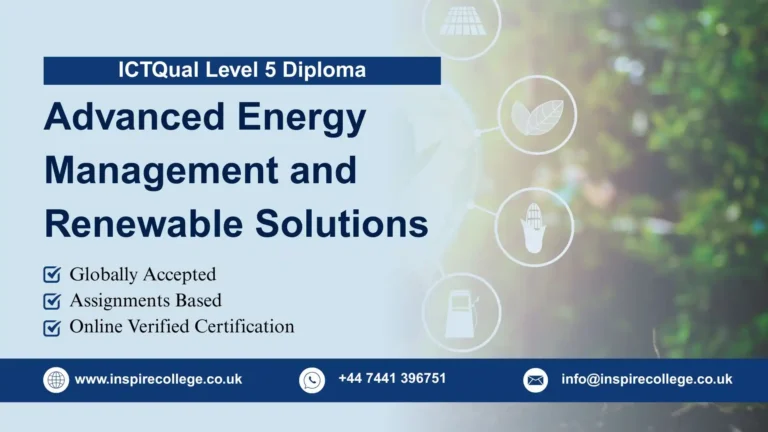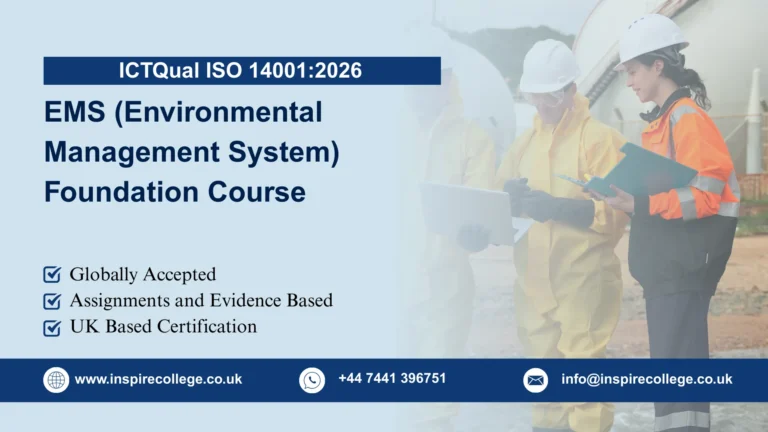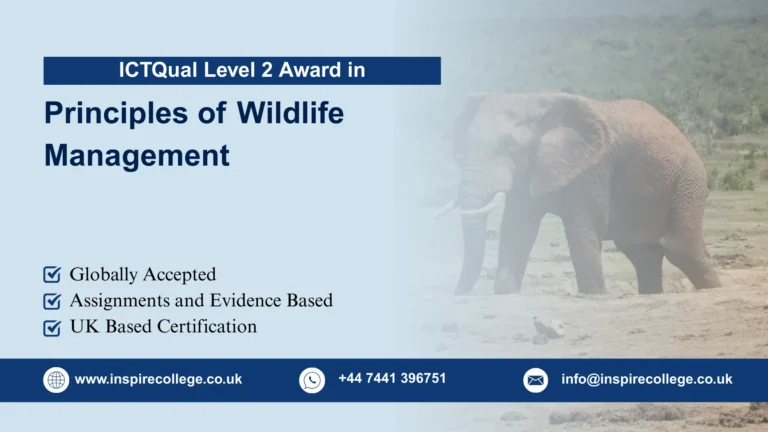
ICTQual Level 6 Diploma in Environmental Engineering 360 Credits – Three Years
The Level 6 Diploma in Environmental Engineering is an advanced qualification designed for individuals looking to build expertise in the field of environmental engineering. This course offers an in-depth understanding of key environmental issues and equips students with the technical skills needed to address complex challenges in environmental management and sustainability. Typically completed over three years, the diploma is ideal for those who wish to pursue a career in engineering solutions that benefit the environment, ensuring a balance between development and ecological protection.
Throughout the three-year program, students gain a comprehensive knowledge of environmental laws, pollution control technologies, waste management strategies, and sustainable energy systems. The curriculum is carefully designed to combine theoretical learning with practical experience, making students highly competitive in the job market. Upon completion of the diploma, graduates are prepared to take on roles in environmental consultancy, government agencies, and private sectors, where they can make a significant impact on environmental conservation and management.
The Level 6 Diploma in Environmental Engineering is structured to ensure that students not only develop technical skills but also hone their critical thinking and problem-solving abilities. With an emphasis on both local and global environmental issues, the course covers topics such as climate change mitigation, water resource management, and renewable energy solutions. Students also explore emerging technologies that aim to reduce the environmental footprint of industries and urban development.
In addition to core technical knowledge, the course provides an opportunity to understand the regulatory frameworks surrounding environmental protection. This includes studying environmental impact assessments, sustainability practices, and the ethical considerations in engineering solutions. By incorporating these elements into the syllabus, the diploma ensures that students are well-equipped to navigate the evolving demands of the environmental engineering profession.
Graduates of the Level 6 Diploma in Environmental Engineering are highly regarded for their ability to tackle environmental challenges with innovative and sustainable solutions. Whether working in engineering firms, consultancy companies, or non-profit organizations, the qualification prepares individuals to lead initiatives that drive positive environmental change. With a growing demand for skilled professionals in the field of environmental engineering, completing this diploma opens doors to a wide range of career opportunities in an industry that continues to expand as global awareness of environmental issues rises.
The Level 6 Diploma in Environmental Engineering provides an excellent foundation for anyone seeking to make a meaningful contribution to environmental sustainability. Over the course of three years, students develop the technical expertise, problem-solving capabilities, and ethical understanding necessary to become leaders in this critical field.
- Applicants must be at least 18 years old.
- A minimum of a Level 5 qualification (or equivalent) in a related field such as environmental science, engineering, or a technical discipline. This could include a Level 5 Diploma, a Higher National Diploma (HND), or a relevant undergraduate qualification.
- Alternatively, applicants with significant work experience in environmental engineering or a related field may be considered on a case-by-case basis.
- Academic prerequisites typically include qualifications equivalent to GCSEs or A-levels, with a strong foundation in Mathematics, Science, and English (grade C or above).
Mandatory Units
The Level 6 Diploma in Environmental Engineering 360 Credits – Three Years, achieve the qualification candidates must achieve all of the mandatory units:
Mandatory Units
Year 1: Foundation in Environmental Engineering Principles
- Introduction to Environmental Engineering
- Environmental Legislation and Policy
- Sustainable Development Practices
- Introduction to Environmental Science
- Waste Management Systems
- Water Quality and Management
- Energy Resources and Sustainability
- Environmental Impact Assessment (EIA) Principles
- Soil and Groundwater Contamination
- Basic Environmental Chemistry
- Environmental Risk Assessment
- Introduction to Environmental Engineering Design
Year 2: Intermediate Environmental Engineering Concepts
- Pollution Control Technologies
- Advanced Environmental Legislation and Compliance
- Sustainable Urban Development
- Environmental Monitoring and Data Analysis
- Renewable Energy Technologies
- Ecological Engineering
- Climate Change Mitigation and Adaptation
- Environmental Engineering Materials
- Water Resources Engineering
- Hazardous Waste Management
- Sustainability in Construction Engineering
- Energy Efficiency in Industrial Systems
Year 3: Advanced Environmental Engineering and Professional Practice
- Advanced Environmental Impact Assessment (EIA)
- Environmental Remediation Techniques
- Advanced Water Treatment Systems
- Sustainable Wastewater Management
- Environmental Engineering Project Management
- Global Environmental Issues and Solutions
- Industrial Environmental Management
- Environmental Policy and Economics
- Sustainable Energy Systems
- Advanced Soil and Groundwater Remediation
- Green Engineering and Innovation
- Professional Ethics in Environmental Engineering
Year 1: Foundations of Environmental Engineering
- Introduction to Environmental Engineering
- Understand the fundamental concepts and scope of environmental engineering.
- Explain the role of environmental engineers in solving global environmental issues.
- Environmental Science Principles
- Demonstrate knowledge of key environmental science concepts and their applications in engineering.
- Assess the interaction between human activities and environmental systems.
- Basics of Environmental Chemistry
- Understand the chemical processes that impact environmental systems.
- Identify pollutants and their effects on air, water, and soil quality.
- Introduction to Renewable Energy Systems
- Gain an overview of renewable energy technologies, including solar, wind, and biomass.
- Evaluate the environmental benefits and challenges of renewable energy sources.
- Mathematics for Environmental Engineers
- Apply mathematical principles to solve engineering problems related to environmental systems.
- Develop proficiency in calculations involving fluid dynamics, pollution control, and energy efficiency.
- Engineering Mechanics and Materials
- Understand the principles of engineering mechanics in the context of environmental engineering.
- Identify materials used in environmental engineering and their properties.
- Introduction to Fluid Mechanics
- Grasp basic concepts in fluid mechanics, including flow, pressure, and velocity.
- Apply fluid dynamics principles to environmental engineering problems such as water treatment and waste management.
- Pollution Control and Prevention
- Identify various types of pollution and their sources.
- Propose engineering solutions for the prevention and control of pollution in different environmental contexts.
- Environmental Regulations and Standards
- Understand environmental laws and regulations at national and international levels.
- Evaluate how these regulations impact environmental engineering practices.
- Soil Science and Geotechnical Engineering
- Gain knowledge of soil properties and their significance in environmental engineering.
- Analyze soil contamination and remediation techniques.
- Introduction to Sustainable Development
- Define sustainable development and its importance in environmental engineering.
- Identify practices that promote sustainability in engineering projects.
- Communication Skills for Engineers
- Develop effective communication skills for technical writing, presentations, and teamwork in engineering contexts.
- Present complex environmental engineering concepts clearly and concisely.
Year 2: Specialized Environmental Engineering Topics
- Advanced Water Supply and Wastewater Treatment
- Understand advanced techniques in water purification, treatment, and distribution.
- Design and evaluate wastewater treatment systems for environmental sustainability.
- Air Pollution Control and Management
- Identify sources of air pollution and their environmental impacts.
- Develop strategies for air quality monitoring and pollution control.
- Waste Management and Recycling Techniques
- Analyze waste management practices and recycling technologies.
- Design sustainable waste management systems for urban and industrial applications.
- Hydrology and Water Resources Management
- Apply hydrological principles to manage water resources efficiently.
- Design systems for water conservation and sustainable usage.
- Advanced Renewable Energy Technologies
- Analyze and evaluate emerging renewable energy technologies.
- Develop engineering solutions for integrating renewable energy systems into the existing infrastructure.
- Environmental Impact Assessment (EIA)
- Conduct environmental impact assessments for engineering projects.
- Identify potential environmental impacts and propose mitigation strategies.
- Risk Management in Environmental Engineering
- Apply risk management strategies to assess and minimize environmental risks.
- Develop risk assessment models for environmental engineering projects.
- Environmental Economics and Policy
- Understand the economic aspects of environmental issues and sustainability.
- Analyze policies and their impact on environmental engineering practices.
- Sustainable Infrastructure and Urban Planning
- Design and evaluate infrastructure projects with a focus on sustainability.
- Integrate sustainable urban planning principles in engineering solutions.
- Climate Change and Environmental Adaptation
- Examine the impacts of climate change on environmental systems.
- Develop engineering strategies for adaptation to climate change challenges.
- Environmental Data Collection and Analysis
- Gather and analyze environmental data for decision-making in engineering projects.
- Use software tools and methodologies to interpret environmental data effectively.
- Environmental Project Management
- Manage environmental engineering projects from planning to execution.
- Develop project management skills, including budgeting, timelines, and team coordination.
Year 3: Advanced Studies and Practical Applications
- Sustainable Resource Management
- Understand principles of sustainable resource use and conservation.
- Design systems for efficient management of natural resources.
- Advanced Environmental Chemistry
- Apply advanced chemical principles to address complex environmental challenges.
- Analyze the chemical processes involved in pollutant degradation and treatment.
- Energy Efficiency and Green Technologies
- Design and implement energy-efficient systems and green technologies.
- Analyze the role of energy efficiency in reducing environmental impacts.
- Environmental Monitoring and Data Systems
- Develop and implement systems for monitoring environmental parameters.
- Use advanced technologies for environmental data collection and analysis.
- Life Cycle Assessment and Eco-Design
- Conduct life cycle assessments to evaluate the environmental impacts of products and processes.
- Apply eco-design principles to create environmentally friendly products and systems.
- Green Building and Construction Techniques
- Understand sustainable construction methods and green building standards.
- Design and implement energy-efficient and environmentally sustainable buildings.
- Environmental Biotechnology
- Explore the use of biotechnology in environmental engineering applications.
- Analyze the role of bioremediation and microbial technologies in environmental cleanup.
- Environmental Law and Ethics
- Understand the legal and ethical considerations in environmental engineering.
- Evaluate the role of laws in regulating environmental protection and engineering practices.
- Research Methodology in Environmental Engineering
- Develop skills in research design and methodology specific to environmental engineering.
- Conduct scientific research and analysis in environmental engineering topics.
- Environmental Engineering Design Projects
- Apply engineering principles to design sustainable environmental systems and solutions.
- Work on complex design projects addressing real-world environmental issues.
- Industrial Internship in Environmental Engineering
- Gain hands-on experience through an industrial internship.
- Apply theoretical knowledge to practical environmental engineering tasks in the workplace.
- Research Project and Dissertation
- Conduct independent research on a selected environmental engineering topic.
- Present findings in a comprehensive dissertation that demonstrates critical thinking and research skills.
The Level 6 Diploma in Environmental Engineering is ideal for individuals who are passionate about addressing environmental challenges through engineering solutions. This course is designed for:
- Aspiring Environmental Engineers: Those seeking to specialize in the field of environmental engineering, focusing on sustainability, pollution control, and resource management.
- Professionals in Related Fields: Individuals with backgrounds in civil engineering, mechanical engineering, or other technical disciplines who wish to transition into environmental engineering and expand their expertise.
- Environmental Enthusiasts: Individuals passionate about protecting the environment and interested in developing the skills needed to contribute to environmental sustainability.
- Graduates Seeking Specialization: Recent graduates in science or engineering disciplines looking for advanced training to specialize in the environmental sector.
- Career Changers: Professionals from other sectors such as construction, energy, or manufacturing who are looking to shift their career focus toward environmental engineering and sustainable practices.
- Government and NGO Professionals: Those working in governmental or non-governmental organizations involved in environmental protection, policy-making, or sustainability initiatives.
The course is particularly suited for those aiming to work in industries such as environmental consultancy, government agencies, waste management, renewable energy, and urban planning, where the application of engineering principles to environmental protection is critical.
Register Now
FAQs for ICTQual Level 6 Diploma in Environmental Engineering 360 Credits – Three Years






